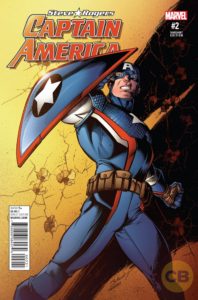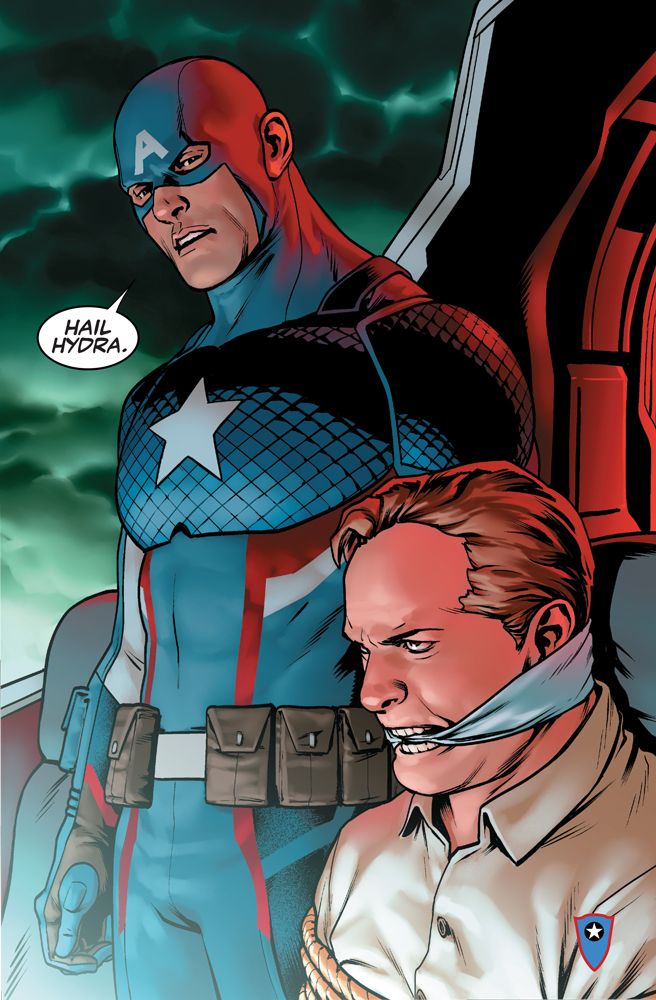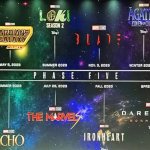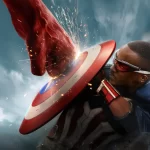Steve Rogers and the “Plot Twist” Heard ‘Round the World
A few weeks ago, the comic world was in an uproar as the new Captain America: Steve Rogers title revealed that Steve – and therefore Cap – was an undercover Hydra agent.
People were understandably upset about turning one of Marvel’s most beloved heroes into a villain. But not just any villain, a villain with an organization that is the Marvel world’s equivalent of the Nazi Party. And this is not just any hero, after all. Captain America was created by two Jewish men in response to the pro-Nazi sympathies that were prevalent in the United States before we entered World War II. There was a massive outcry after the debut issue hit stands a month ago.
The thing is, I think we all knew – even with various Marvel bigwigs, including Captain America: Steve Rogers writer Nick Spencer, telling us otherwise – that this was just a gimmick. Even Spencer flat out stating that it was not mind control, or a clone, or a robot did not convince people that this change would be permanent. However, knowing that this would all eventually be undone doesn’t change the fact that it was done in the first place, and it doesn’t make it any less insensitive.
Arguments could be made that a Hydra Captain America is exactly the hero that America deserves right now, but I don’t think that’s fair to a large population of the country – not to mention the comic’s international audience. Spencer told the Daily Beast that turning Steve Rogers into a Hydra plant was meant to make use of the idea of Cap as a symbol and explore recent growth of white supremacist and nationalist organizations in the country. This is all well and good, but the idea of the hero secretly being the villain isn’t new or interesting; I’m sure it’s possible to do it in an interesting way, but the idea itself is hardly original or groundbreaking. There are so many potential storylines that could be explored in comics that falling back on plots like this seems, for lack of a better word, lazy.
Captain America, I have always thought, represents American ideals more so than its reality. He is supposed to be the best of us, someone we should strive to live up to. He is meant to be a symbol of hope, of freedom, of justice – for everyone; Hydra represents none of these things.
 The second issue of Captain America: Steve Rogers hit stands last Wednesday, and what do you know, it turns out that all of Steve’s memories of going to Hydra meetings and being a double agent were implanted by Kobik, who in turn is under the influence of the Red Skull. I don’t know about you guys, but I am absolutely shocked by this “plot twist”. I’m also completely shocked that they lied about it.
The second issue of Captain America: Steve Rogers hit stands last Wednesday, and what do you know, it turns out that all of Steve’s memories of going to Hydra meetings and being a double agent were implanted by Kobik, who in turn is under the influence of the Red Skull. I don’t know about you guys, but I am absolutely shocked by this “plot twist”. I’m also completely shocked that they lied about it.
I shouldn’t be surprised that they have exploited the emotions of Captain America fans for what feels like a cheap ploy to get attention for the new title. I am, however, disappointed and a little disgusted at how they handled the reaction. In an interview with ComicBook.com, Marvel Editor-in-Chief Axel Alonso seemingly compared the Steve/Hydra storyline to changing the gender or ethnicity of a character. I am really not okay with that. There is a fundamental difference between going, “Hey, what if we made this character a woman?” and saying, “Hey, what if we made this character evil?”
We’re trained to anticipate a strong reaction to change or a big plot twist like this, whether it’s a female Thor or the new Ms. Marvel or the Korean-American Hulk. We didn’t expect the reaction to be anywhere this big. It was comparable to the way that people reacted to the death of Captain America. I think a lot of the people reacting most violently aren’t people that go to the comic book stores every Wednesday and are trained to understand the way the comics work and the rhythms and how we could do this kind of thing with our heroes.
I’m also not okay with the implication that the people who were upset by the story just don’t understand comics. Creators, please understand that your audience is smarter than you realize. Sometimes, the backlash isn’t because we “didn’t get” something. Sometimes, the backlash is because we understood it perfectly, and this is us telling you that we don’t like it.
Now, to be fair, there was considerable backlash when it was announced that Sam Wilson would take up the mantle of Captain America in the wake of Steve’s death. I’d like to think we can all recognize the difference between these, though. Having Sam become Captain America is the same as making Jane Foster the new Thor; these changes can allow writers to play around with the character while keeping the essence in tact. Captain America: Steve Rogers is taking Cap’s legacy and crushing it with the heel of his boot.
Mostly, I’m just tired of being manipulated. I realize that, to some degree, this is going to happen in whatever media you consume. Television shows, movies, books, comics, they are all designed to get you emotionally invested. When people care about things, they talk about it to others. I’m sure there were a lot of people who heard about the Steve/Hydra plot and thought it sounded interesting and picked it up because of the fans’ reactions, just as I’m sure there were a lot of people who vowed to never buy another issue of a Captain America comic. And creators just can’t give away the details of their plots, otherwise there would be no reason to consume the media in the first place.
Still, I would almost have respected them more if it turned out this was actually Steve Rogers – that the memories weren’t implanted, they were real. It’s one thing to say that it’s real and then reveal that it wasn’t really real; it’s quite another to make such an outrageous claim and then have the guts to actually follow that up. As it is, Steve having always been Hydra is a lie, not a twist, and no one was surprised. Just please keep MCU Cap away from this mess, I’m begging you.
By the way, if you want a different take on Captain America, consider picking up U.S.Avengers when it debuts in December. It features Danielle Cage (aka the daughter of Luke Cage and Jessica Jones) as a Captain America from the future.
Author: Jamie Sugah
Jamie has a BA in English with a focus in creative writing from The Ohio State University. She self-published her first novel, The Perils of Long Hair on a Windy Day, which is available through Amazon. She is currently an archivist and lives in New York City with her demon ninja vampire cat. She covers television, books, movies, anime, and conventions in the NYC area.
Help support independent journalism. Subscribe to our Patreon.
Copyright © The Geekiary
Do not copy our content in whole to other websites. If you are reading this anywhere besides TheGeekiary.com, it has been stolen.Read our








1 thought on “Steve Rogers and the “Plot Twist” Heard ‘Round the World”
Comments are closed.